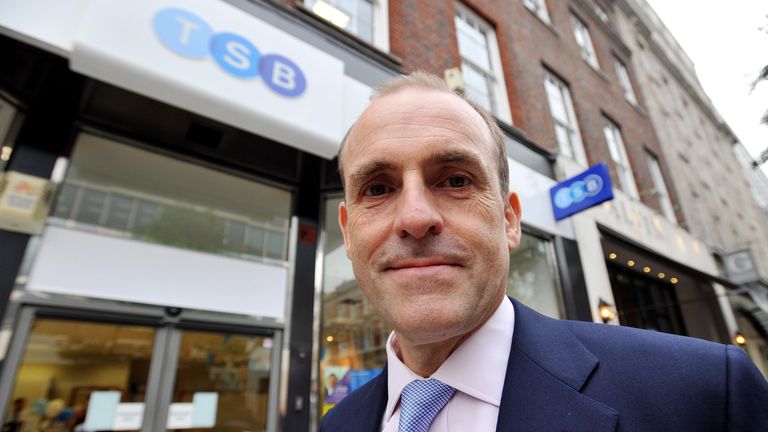Paul Pester, the former TSB Bank chief executive, is joining Britain’s fintech frenzy by launching the first UK-based social networking app enabling friends and family members to share money.
Sky News has learnt that Mr Pester has teamed up with Anthony Thomson, the Metro Bank and Atom Bank founder, and former CompareTheMarket chief Matthew Donaldson to set up Loop, which began a period of beta-testing last week.
City sources said that Loop had raised a round of seed funding from a group of wealthy investors, and was now preparing for a larger Series A fundraising to take place in early 2022.
Mr Pester and his co-investors are understood to have identified a growing trend of informal money-sharing among friends and family valued at more than £12.5bn annually in the UK alone.
The trend has grown significantly during the pandemic, with millions of people on furlough and greater uncertainty in the jobs market, while lockdown restrictions made meeting friends and family members more difficult.
AdvertisementAt the same time, cash usage has dwindled dramatically, with online money transfer services soaring in popularity.
Loop’s pitch to investors is said to have been predicated on the fact that this area of consumer finance is not supported by banks or the wave of app-based neobanks which have emerged over the last decade, such as Monzo, Starling Bank or Zopa.
More from BusinessThe launch of Loop will represent Mr Pester’s most publicly visible commercial venture since he left TSB in 2018 after an IT meltdown that he said had left the bank “on its knees”.
A subsequent inquiry into the crisis, which left millions of customers with no access to their accounts for weeks, laid the blame at the door of the TSB board and that of its Spanish parent, Banco Sabadell.
Since then, Mr Pester has become chair of the campaign group Fairer Finance’s advisory board, and has advised private equity groups including KKR and Pollen Street Capital on investments in the financial services sector.
Mr Pester, who also ran Virgin Money, is understood to have been working on the development of Loop for roughly 18 months.
The involvement of Mr Thomson and Mr Donaldson creates a team with huge experience in digital finance ventures.
Mr Thomson recently presided over the sale of 86400, a digital bank he set up in Australia, for nearly £120m.
He had previously been responsible for establishing Metro Bank, Britain’s first new high street lender for a century, and Atom Bank, one of the first app-only banks.
Mr Donaldson, meanwhile, oversaw the launch of CompareTheMarket, which went on to become one of Britain’s biggest price comparison services.
Loop is planning to launch nationally early next year, with its founders confident that there is a significant commercial opportunity in the money-sharing market.
The app has been designed as a social network, and will initially be aimed at students and young professionals.
Research suggests that one-third of the UK population lend to and borrow money from friends and family members each year, while the City regulator has estimated that up to 6m adults borrowed from friends and family each month during the pandemic.
Consumers who register on the Loop app will be able to create a social network which enables them to easily share money with each other.
One investor said the service would help people to avoid having to draw on overdrafts or getting pulled into high-cost lending services, while alleviating social anxieties around repaying money to friends and family.
Industry data suggests there are roughly £10bn of overdrafts outstanding at any one time, with 30pc of those amounting to less than £50.
Banks make more than £2bn in annual profit from the overdraft market.
Precise of Loop’s business model are unclear, although a person close to the business said it would be free to use for consumers, with no interest charged to borrow money.
Loop is instead expected to drive revenue by partnering with e-commerce platforms to offer users the option to send friends offers and discount codes in return for having borrowed money from them, according to the person.
A spokesman for Loop declined to comment on Sunday.
